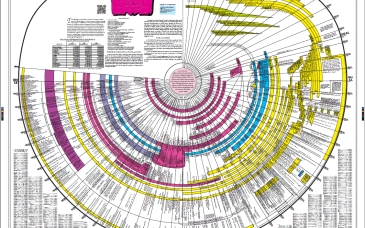About the Book of the Secrets of Enoch
(also referred to as "Slavonic Enoch" or "2 Enoch")
An entirely different Enoch manuscript has survived in the Slavonic language. This text, dubbed "2 Enoch" and commonly called "the Slavonic Enoch," was discovered in 1886 by a professor Sokolov in the archives of the Belgrade Public Library. It appears that just as the Ethiopic Enoch ("1 Enoch") had escaped the sixth-century Church suppression of Enoch texts in the Mediterranean area, so a Slavonic Enoch had survived far away, long after the originals from which it was copied were destroyed or hidden away.
Specialists in the Enochian texts surmise that the missing original form which the Slavonic was copied was probably a Greek manuscript. This may have been, in turn, based on a Hebrew or Aramaic manuscript.
Many Aramaic fragments of 1 Enoch have been recovered in the past few decades from the Qumran caves which preserved the scriptures of the Essenes, showing the importance of Enoch to the Essene community. It is also possible that the core of the Slavonic Enoch, The Book of the Secrets of Enoch, was known to the Essenes.
The Slavonic text bears evidence of many later additions to the original manuscript. Such editorializing is common in religious texts, and it can include, unfortunately, the deletion of teachings considered "erroneous."
Because of certain calendrical data in the Slavonic Enoch, some claim the text cannot be earlier than the seventh century A.D. Most scholars see Christian influences in the Slavonic Enoch and therefore assign it, at the earliest, to the first century A.D.
But some see these passages not as evidence of Christian authorship, but as later Christian interpolations into an earlier manuscript. Enochian specialist R.H. Charles, for instance, believes that even the better of the two Slavonic manuscripts contains interpolations and is, in textual terms, "corrupt."
Most scholars agree that the Slavonic Enoch is an eclectic and syncretistic text, perhaps compiled by Christian writers but probably having origins in an earlier tradition. It may be dependent upon the Ethiopic Enoch, although it is recognized as a separate part of the literary tradition concerning the patriarch Enoch.
The Slavonic Enoch thus could preserve another part of a profound teaching on the fallen angels known to the early Judaic peoples but mainly lost to us. For this reason, the Slavonic Enoch is valuable, despite its editorial shortcomings.
So although the fingerprints of many centuries of later editors are left upon this manuscript, they do not necessarily invalidate the authenticity and antiquity of this book and its teaching. The ring of truth echoes from many of its pages.
One of the most fascinating passages of the Slavonic Enoch is the account of the dramatization of eternity found in Chapter 33. As the world was made in six days, so its history would be accomplished in 6,000 years, and this would be followed by 1,000 years of rest, when the balance of conflicting moral forces has been struck and human life has reached the ideal state. (A reference of this conflict is also found in The War Scroll, a future battle between the Sons of Light and the Sons of Darkness. These writings were recently discovered in Qumran Cave 1, which are part of the collection of The Dead Sea Scrolls). At the close of this 7,000 year cycle would begin the 8th Eternal Day, when time should be no more.
As with the Ethiopic text of The Book of Enoch, the chapters of this book may be spartan editions of several separate and larger books. Many scholars have seen in The Book of Enoch separate books titled: The Ancient Book, The First and Second Book of the Watchers, The First Book of Secrets (or The Vision of Wisdom), The Vision of Noah and History, and The Book of Astronomy. There could be a similar set of resources, differently compiled, behind the Slavonic Enoch.
Enoch tells us here that he wrote 366 books. Why, then, should we not postulate some one or two or ten of his "lost" books behind this Slavonic Enoch?
